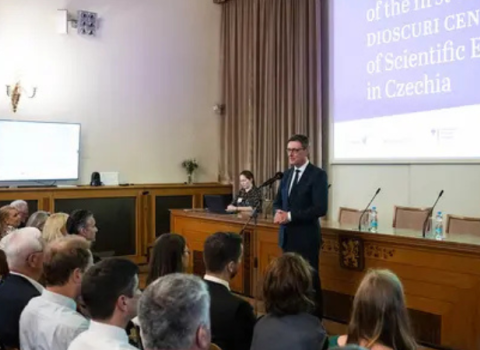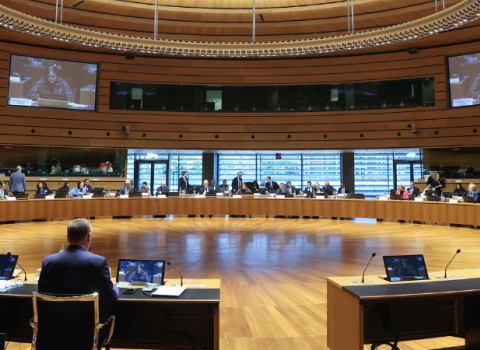Spring is here and that means the Hungarian presidency of the EU, scheduled for the second half of this year, is fast approaching. One plan in the works is to propose a new partnership to boost development of the bioeconomy of central and eastern European countries. The Hungarians want to model this on the Mediterranean PRIMA partnership. Elsewhere, we look at the impact of the EU unfreezing €137 billion of funding for Poland, the possible effect of two new European Investment Bank offices opening in the Baltics, and a foresight report that sets out policy suggestions for boosting innovation in the Western Balkans

The latest news
HUNGARY’S BIOECONOMY PLOT: You heard it here first: Hungary wants a new EU initiative to support the bioeconomy of central and eastern Europe and is angling for a partnership similar to PRIMA, the Partnership for Research and Innovation in the Mediterranean Area, which brings together countries around the Mediterranean Sea to support research cooperation in water management, agriculture, energy and food production. The proposal will be put forward during Hungary’s EU presidency in the second half of this year, with an expected start date for the partnership in 2028. Read more here.
FUNDS DEFROSTED BUT CAN POLAND COOK AN OMELETTE?: After a two-year delay, the EU has finally agreed to release around €137 billion in funds to Poland, following reform of the judiciary. It’s a huge boon for the country’s economy and could have a positive effect on its R&D ecosystem, but stakeholders on the ground warn that the money must be backed up by strategy and rules. As one Polish analyst told us, “moving eggs from one basket to another does not on its own imply that we are be able to cook ourselves a delicious omelette.” Anna Rzhevkina has the story.
EUROPEAN INVESTMENT BANK: The bank is increasing its presence in the Baltics, opening two new offices in Tallinn and Riga to add to its regional office in Vilnius. The goal is to catalyse capital markets in the region, which despite the dynamism seen in some sectors, remain relatively weak. The bank’s push into the region could help close the funding gap in the Baltics, which are making a name for themselves as fast-developing innovators. Ian Mundell has the story.
CAN THE WESTERN BALKANS STEP UP ITS INNOVATION GAME? The next 12 years could be crucial for economic development in the Western Balkans, with EU accession on the horizon for most of the region’s countries. There is significant potential in terms of innovation, but policymakers must start making changes now if the region is to reach its potential, according to a new report. If the countries step up, the region can be “a significant player in the European economy and can contribute to its competitiveness and innovation performance”. Read the full story here.
HAVE SOMETHING TO SAY? We welcome opinion pieces and other contributions on R&I policy in central and eastern Europe. Send yours to [email protected].
In other news
BUDAPEST UNIVERSITY’S NEW CHINESE PARTNER: Corvinus University of Budapest has signed a new research cooperation agreement with the Chinese University of Hong Kong Shenzhen Research Institute. The aim is for the institutions to work jointly on areas such as artificial intelligence and digitalisation. The memorandum of understanding, labelled as the Academic and Innovation Matrix, will target both academic researchers and start-ups.
The partnership is based on a longstanding relationship between professors Péter Baranyi and Yeung Yam of each partnering institution. “To the best of my knowledge, this agreement is the first Hungarian-Chinese knowledge transfer cooperation that brings together education, research, innovation and incubation," said Baranyi.
The agreement is part of China’s expansive Belt and Road strategy that aims to build infrastructure and collaborations in over 150 countries around the world.
ESTONIA TO JOIN CERN: Estonia is on track to join the European Organisation for Nuclear Research (CERN) after members voted in favour of full membership for the Baltic country. Estonia, already an associated member, will gain further access and powers by becoming a full member, and Estonian companies will also be able to participate in international industrial procurement without limits. A final approval from the national governments of CERN’s member states is required. Estonia will become CERN’s 24th full member.
WIDENING CALLS NEED RESEARCH FOCUS: Widening measures should have a greater focus on funding research-based activities under the EU’s next framework programme, FP10, according to the European University Association (EUA). The Widening measures were brought into the EU’s framework programme to help close the east-west performance gap. But EUA thinks the current instruments tend to focus too much on funding mutual learning and networking activities, rather than research projects. “Consequently, engaging in widening instruments has not yet been translated into a significant increase in the participation of countries with lower R&I capacity in the programme,” EUA says in a new paper outlining its vision for FP10. The association also calls for an assessment of current Widening instruments to gauge how well they are working and whether they should be continued.
WHAT’S HOLDING YOUNG RESEARCHERS BACK?: A new study has found that young researchers in Hungary, Poland and Slovakia still face significant challenges in moving from academic posts into industry. Among the key findings are that 85% of the 152 respondents said they were not confident in understanding intellectual property strategy, and 96% wanted to increase their expertise in the translation of basic research and collaboration with industry. Read the full paper here.
CHILDCARE ESSENTIAL FOR FEMALE RESEARCHERS: Prominent Hungarian scientist Katalin Karikó has said that quality and affordable childcare is essential to help female researchers advance their careers. Karikó rose to fame after her research laid the groundwork for the development of mRNA vaccines that were vital in combating the COVID-19 pandemic. She received the 2023 Nobel prize jointly with Drew Weissman for her work. In an interview with the University of Szeged, where she is a professor, Karikó says Hungary’s kindergarten network helped her because she could return to the laboratory three months after the birth of her daughter. “Nowadays, women working in the academic sphere are greatly helped by the freedom provided by flexible working hours and the possibility of remote work,” Karikó said.
FINANCIAL BOOST FOR CZECH SCHOLARS: Czechia has introduced a minimum income guarantee for full-time doctoral students of 1.2 times the minimum wage as part of an amendment to its Universities Act. In addition, universities are no longer required to set fees for PhD studies taught in a foreign language, as part of efforts to internationalise its higher education system.
NEW INNOVATION COUNCIL FOR SLOVENIAN RESEARCH AGENCY: Slovenia has appointed the first Innovation Council of its new research agency, ARIS. ARIS encompasses basic research and projects on technologies further along the development pathway. It was recently created to replace the former agency, ARRS. The new Innovation Council is made up of seven members who will have a two-year mandate.
CROATIAN MOBILITY PLAN: Croatia has adopted a new plan for encouraging the mobility of researchers for the period 2024 - 2027. It includes the goal of ensuring stable and continuous calls for competitive funding for young researchers and the implementation of European Research Area objectives.
WESTERN BALKANS MOBILITY SCHEME: A new mobility scheme for PhD and post-doctoral researchers in the Western Balkans has been launched as part of an EU-funded project called Policy Answers. The scheme has a total budget of €100,000 and offers individual researchers up to €5,000 to support placements of between two weeks to six months within the region. More information about the project can be found here.
ESTONIAN GRANT TO ATTRACT RESEARCHERS: The Estonian Research Council has launched a new grant to support R&D institutions in recruiting researchers from abroad. The grant is available to researchers who have not lived or worked in Estonia in the past 12 months and who have completed a postdoctoral programme or conducted research of comparable level abroad. More details here.
SWISS COLLABORATION: Submissions are now open for latest round of MAPS projects that support collaboration between scientists based in Switzerland and their counterparts in Bulgaria, Croatia, Hungary, Poland and Romania. MAPS is run by the Swiss National Science Foundation. The submission period is open until 1 July this year. Find out more here.
Mark your calendars
CLUJ-NAPOCA, 11-13 APRIL: The Romanian Society of Bioinformatics is hosting its second RoBioinfo conference. The idea is to foster collaboration, knowledge exchange, and advancements in bioinformatics, genomics, and related fields, with a specific emphasis on contributing to capacity building initiatives in Romania. More details here.
WARSAW, 18 APRIL: The Recursive, a media outlet focusing on tech in central and eastern Europe, is hosting a conference on the next wave of AI innovation in Warsaw. Find out more here.
BRUSSELS, 18 APRIL: The Brussels-based research and innovation support offices of the Visegrad Four countries of Czechia, Hungary, Poland and Slovakia, will host a conference on research infrastructures in the region. Discussions will touch on the establishment of new infrastructures and the sustainability of current ones, as well as their future under FP10. Find out more here.
ONLINE, 19 APRIL: Several central and eastern European research liaison offices and universities will host a webinar on the EU’s COST Actions. The goal is to explain the actions and showcase the experience of Lithuania, Poland, Slovenia, and Hungary in engaging with them. Find out more here.
KAUNAS, 21 - 23 MAY: The 20th International Conference of Young Scientists on Energy and Natural Sciences Issues, organised by the Lithuanian Energy Institute and Lithuanian Research Centre for Agriculture and Forestry, takes place in May this year. The goal is to discuss issues and perspectives on natural sciences and the energy sector on a global scale. Find out more here.
The Widening newsletter is a roundup of news and analysis of research and innovation policy and investments in central and eastern Europe, delivered to your inbox twice a month. Sign up here.





 A unique international forum for public research organisations and companies to connect their external engagement with strategic interests around their R&D system.
A unique international forum for public research organisations and companies to connect their external engagement with strategic interests around their R&D system.